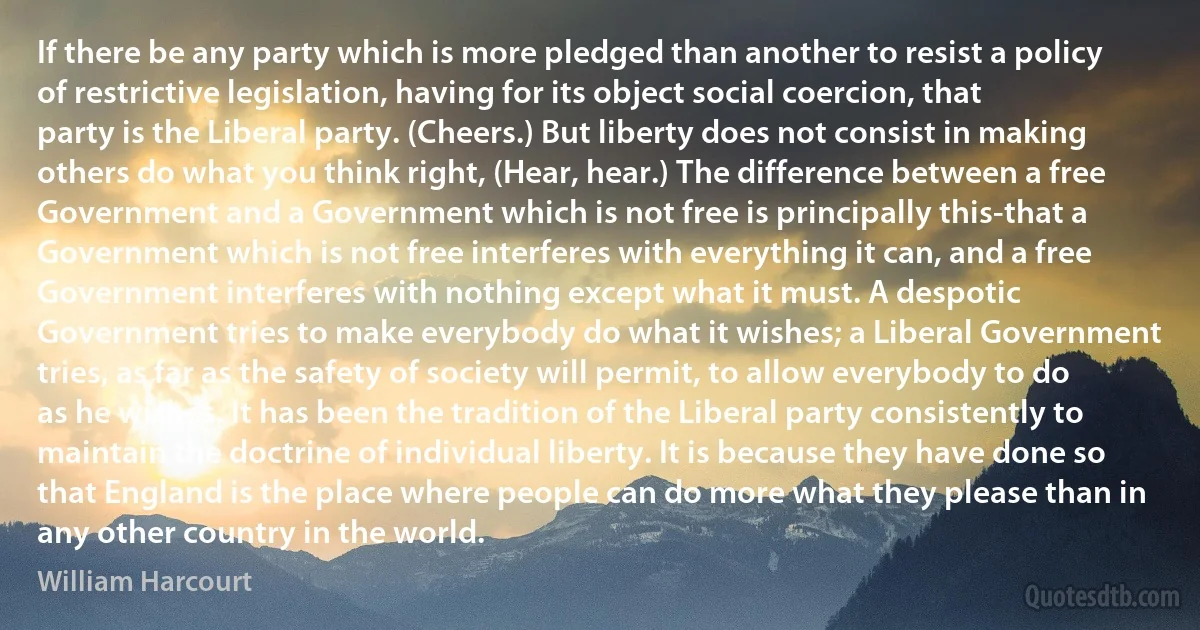
If there be any party which is more pledged than another to resist a policy of restrictive legislation, having for its object social coercion, that party is the Liberal party. (Cheers.) But liberty does not consist in making others do what you think right, (Hear, hear.) The difference between a free Government and a Government which is not free is principally this-that a Government which is not free interferes with everything it can, and a free Government interferes with nothing except what it must. A despotic Government tries to make everybody do what it wishes; a Liberal Government tries, as far as the safety of society will permit, to allow everybody to do as he wishes. It has been the tradition of the Liberal party consistently to maintain the doctrine of individual liberty. It is because they have done so that England is the place where people can do more what they please than in any other country in the world.
William HarcourtRelated topics
coercion country difference done doctrine everybody everything far free government having legislation liberty making nothing party people place restrictive right think world othersRelated quotes
I think it's already apparent that a good part of this Nation understands - if only instinctively - that anything which seems to suggest that God favors a political party or the establishment of a state church, is wrong and dangerous.
Way down deep the American people are afraid of an entangling relationship between formal religions - or whole bodies of religious belief - and government. Apart from constitutional law and religious doctrine, there is a sense that tells us it's wrong to presume to speak for God or to claim God's sanction of our particular legislation and His rejection of all other positions. Most of us are offended when we see religion being trivialized by its appearance in political throw-away pamphlets.
The American people need no course in philosophy or political science or church history to know that God should not be made into a celestial party chairman.

Mario Cuomo
At about midnight he arrived, accompanied by six armed SS officers, and was received by my aide-de-camp, Walter Luedde-Neurath. I offered Himmler a chair and sat down at my desk, on which lay, hidden by some papers, a pistol with the safety catch off. I had never done anything of this sort in my life before, but I did not know what the outcome of this meeting might be. I handed Himmler the telegram containing my appointment. "Please read this," I said. I watched him closely. As he read, an expression of astonishment, indeed of consternation, spread over his face. All hope seemed to collapse within him. He went very pale. Finally he stood up and bowed. "Allow me," he said, "to become the second man in your state." I replied that was out of the question and that there was no way I could make any use of his services. Thus advised, he left me at about one o'clock in the morning. The showdown had taken place without force, and I felt relieved.

Karl Dönitz
There is no conceivable reason why all colored people should not be treated according to the merits of each individual. It is not only the plain duty, but also the interest of us all, to have every colored man take the place for which he is best fitted by education, character, ability, manners, and culture. If others insist on keeping him in any lower and poorer place, it is not only his injury, but our universal loss. Yet which of our white congregations would take a colored pastor? How many of our New England villages would like to have colored postmasters, or doctors, or lawyers, or teachers in the public schools? A very slight difference in complexion suffices to keep a young man from getting a place as policeman, or fireman, or conductor, even on the horse cars. The trades-unions are closed against him, and so are many of our stores; while those which admit him are obliged to refuse him promotion on account of the unwillingness of white men to serve under him.

Frederick Douglass
Indeed, if any man can say, that it is not an interesting question, whether his existence terminate at death, or is to be resumed at a future period, and then to continue for ever, he must be of a low and abject mind. To a rational being, capable of contemplating the wonders of nature, and of investigating the laws of it, and to a being of a social disposition, his existence, and the continuance of his rational faculties, must be an object of unspeakable value to him; and consequently he must ardently wish that christianity... may be true. For to a philosopher, who forms his judgment by what he actually observes, the doctrine of soul, capable of subsisting and acting when the body is in the grave, will never give any satisfaction. To every person, therefore, who is capable of enjoying his existence, the christian doctrine of a resurrection opens a glorious and transporting prospect.

Joseph Priestley
Some anti-Americanism derives simply from our being a colossus that bestrides the earth. This resentment may be incurable. But much anti-Americanism derives from the role U. S. political, economic, and military power has played in denying such freedoms to others. U. S. foreign policy has to be rethought. It needs not tweaking but overhauling. We need: a historical reckoning with crimes committed, sponsored, or permitted by the United States. [.. ] A country has to look back before it can move forward. Instituting a doctrine of the mea culpa would enhance our credibility by showing that American decision-makers do not endorse the sins of their predecessors. When Brandt went down on one knee in the Warsaw ghetto [in 1970], his gesture was gratifying to World War II survivors, but it was also ennobling and cathartic for Germany. Would such an approach be futile for the United States?

Samantha Power
